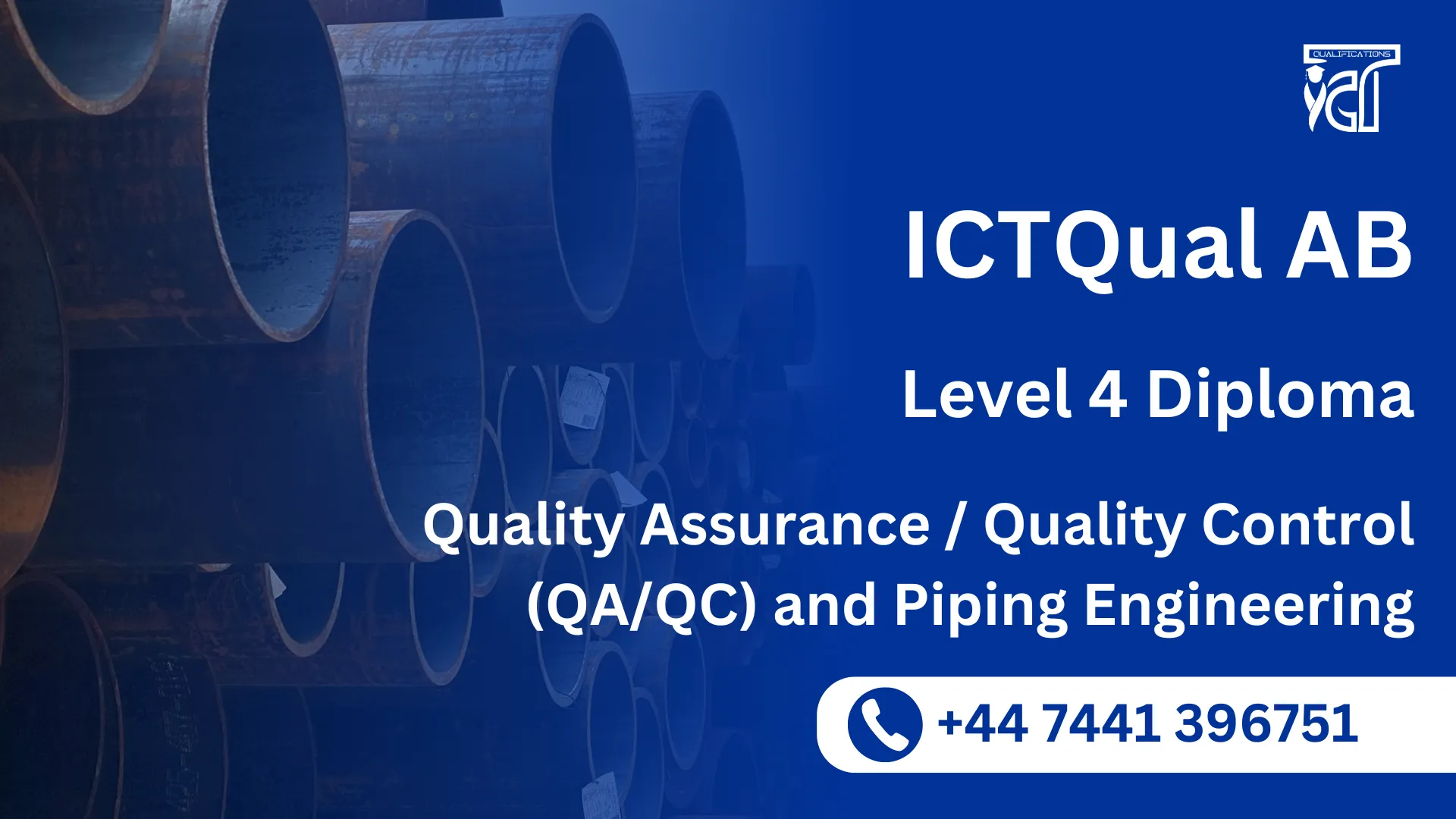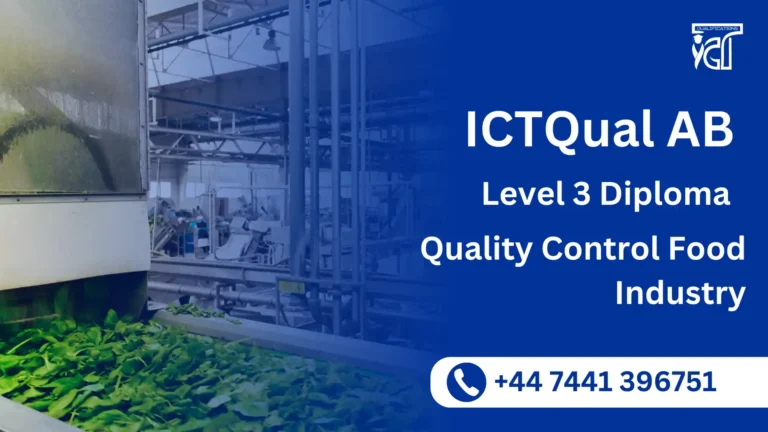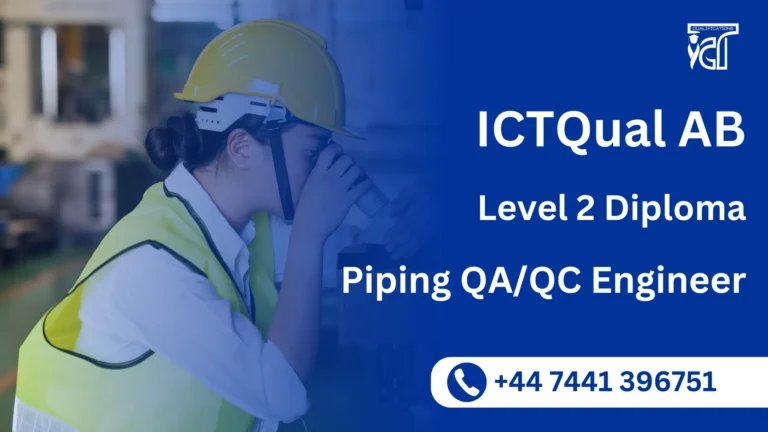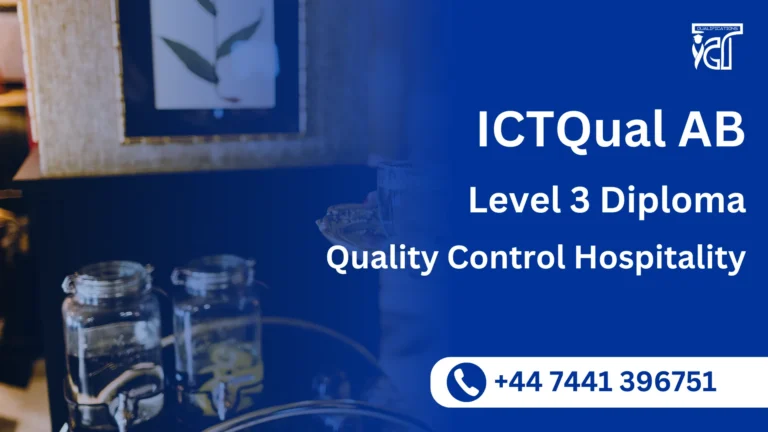The ICTQual AB Level 4 Diploma in Quality Assurance / Quality Control (QA/QC) and Piping Engineering is an entry‑level program designed to introduce learners to the fundamentals of inspection, compliance, and piping systems. It serves as the starting point for individuals who aspire to build a career in QA/QC and engineering, offering a clear pathway into technical and industrial roles.
Learners will gain essential knowledge of QA/QC practices, including the basics of inspection methodologies, defect identification, and welding quality. The course also introduces piping engineering concepts, helping participants understand how piping systems are designed, maintained, and inspected in line with international standards such as ASME, API, and ISO.
The program emphasizes practical learning, enabling learners to support engineers and supervisors in maintaining quality systems and ensuring compliance with safety requirements. Alongside technical training, participants will develop professional skills in documentation, teamwork, and communication, preparing them to contribute effectively to industrial projects.
Completing the ICTQual AB Level 4 Diploma in QA/QC and Piping Engineering opens opportunities for entry‑level roles such as QA/QC assistant, inspection trainee, or piping technician. It also provides a progression pathway to higher qualifications, including the Level 5 Diploma, and eventually advanced diplomas or certifications. This makes the Level 4 Diploma an ideal starting point for learners committed to building a long‑term career in quality assurance, quality control, and piping engineering.
ICTQual AB Level 4 Diploma in Quality Assurance / Quality Control (QA/QC) and Piping Engineering
This qualification, the ICTQual AB Level 4 Diploma in Quality Assurance / Quality Control (QA/QC) and Piping Engineering, consists of 6 mandatory units.
| Sr# | Unit Title |
| 1 | Quality Management Systems (ISO 9001 & International Standards Alignment) |
| 2 | Piping Engineering Design: Isometrics, Material Specifications & Fabrication Control |
| 3 | Advanced Inspection Technologies: Phased Array, Radiography Interpretation |
| 4 | Risk-Based QA/QC Planning & Implementation Strategies |
| 5 | Supplier Qualification, Procurement QA and Vendor Audits |
| 6 | Leadership & Team Management in QA/QC Piping Projects |
Learning Outcomes for the Study Units:
Quality Management Systems (ISO 9001 & International Standards Alignment)
By the end of this unit, the learner will be able to:
- Understand the structure and requirements of ISO 9001 and its application in engineering environments
- Implement quality management principles in line with international standards
- Develop and maintain documented quality procedures and manuals
- Conduct internal audits to ensure system compliance and continual improvement
- Align organisational quality practices with regulatory and global expectations
Piping Engineering Design: Isometrics, Material Specifications & Fabrication Control
By the end of this unit, the learner will be able to:
- Interpret and generate piping isometric drawings and design layouts
- Select appropriate piping materials based on service conditions and standards
- Apply specifications and fabrication controls to ensure weld and material compliance
- Identify fabrication issues and recommend corrective measures
- Integrate design, material, and quality control elements in piping projects
Advanced Inspection Technologies: Phased Array, Radiography Interpretation
By the end of this unit, the learner will be able to:
- Explain the principles and applications of advanced NDT techniques such as Phased Array and digital radiography
- Interpret inspection results to assess weld quality and structural integrity
- Calibrate and operate advanced inspection equipment safely and accurately
- Analyse complex data outputs to identify critical defects
- Apply inspection findings to support quality assurance and project safety
Risk-Based QA/QC Planning & Implementation Strategies
By the end of this unit, the learner will be able to:
- Identify quality risks in piping and engineering processes
- Develop and implement risk-based inspection plans and QA/QC frameworks
- Prioritise inspection and control activities based on risk level and project scope
- Monitor and review the effectiveness of risk-based QA/QC strategies
- Integrate risk management into overall project quality planning
Supplier Qualification, Procurement QA and Vendor Audits
By the end of this unit, the learner will be able to:
- Evaluate and qualify suppliers based on quality, capacity, and compliance standards
- Implement procurement QA procedures to ensure quality throughout the supply chain
- Conduct vendor audits to verify compliance with contract and regulatory requirements
- Monitor supplier performance using quality metrics and key indicators
- Develop supplier improvement plans and manage non-conformities effectively
Leadership & Team Management in QA/QC Piping Projects
By the end of this unit, the learner will be able to:
- Demonstrate leadership skills in managing QA/QC teams within engineering projects
- Communicate quality goals, procedures, and responsibilities across teams
- Resolve conflicts and motivate team members to uphold quality standards
- Coordinate inspection, documentation, and reporting activities efficiently
- Foster a quality-driven culture and promote continuous improvement within teams
The ICTQual AB Level 4 Diploma in QA/QC and Piping Engineering provides learners with a strong entry‑level foundation in inspection, compliance, and piping systems. It is designed for individuals beginning their careers in QA/QC or seeking to gain formal recognition of their skills.
Technical Knowledge
- Introduction to QA/QC principles and inspection basics
- Awareness of piping engineering concepts and welding quality fundamentals
- Familiarity with international codes and standards such as ASME, API, and ISO
- Skills in identifying defects and supporting compliance processes
- Understanding of safety requirements and quality frameworks in industrial projects
Career Development
- Preparation for entry‑level roles such as QA/QC assistant, inspection trainee, or piping technician
- Enhanced employability in industries including oil and gas, construction, power generation, and manufacturing
- Clear progression pathway to Level 5 Diploma and advanced qualifications
- Recognition as a qualification aligned with global industry practices
- Foundation for building a long‑term career in QA/QC and piping engineering
Professional Skills
- Development of documentation and reporting skills for inspection activities
- Ability to support engineers and supervisors in maintaining quality systems
- Teamwork and collaboration skills for industrial project environments
- Problem‑solving abilities for basic QA/QC challenges
- Communication skills for presenting inspection findings clearly
Organizational Impact
- Contribution to improved safety and compliance in industrial projects
- Support in reducing defects and ensuring reliability in piping and welding systems
- Assistance in maintaining cost efficiency by minimizing rework and delays
- Strengthening of organizational credibility through adherence to quality standards
The ICTQual AB Level 4 Diploma in QA/QC and Piping Engineering is designed for learners who are at the very beginning of their professional journey in inspection, compliance, and piping systems. It is suitable for individuals seeking to build a solid foundation in QA/QC practices and gain entry into technical or industrial roles.
Career Starters
- Learners with little or no prior industry experience who want to enter QA/QC and piping engineering
- Individuals seeking their first formal qualification in inspection and compliance
- Candidates motivated to support engineers and supervisors in basic inspection tasks
- Learners preparing for entry‑level roles such as QA/QC assistant, inspection trainee, or piping technician
- Those aiming to progress toward higher qualifications such as the Level 5 Diploma
Technical Enthusiasts
- Learners with an interest in engineering, welding, or industrial systems who want structured training
- Individuals motivated to understand the basics of international codes and standards such as ASME, API, and ISO
- Candidates eager to develop practical skills in defect identification and safety compliance
- Learners who want to strengthen their technical foundation before advancing to supervisory roles
- Those seeking exposure to industrial practices through case studies and applied learning
International Participants
- Learners interested in globally recognized qualifications that enhance employability across industries
- Individuals aiming to work on projects where QA/QC and piping knowledge is essential
- Candidates motivated to improve technical English communication for industrial collaboration
- Learners preparing for opportunities in oil and gas, construction, power generation, or manufacturing sectors
- Those seeking qualifications that support mobility across countries and regions
Motivated Learners
- Individuals committed to building a long‑term career in QA/QC and piping engineering
- Learners motivated to develop teamwork, documentation, and communication skills for industrial environments
- Candidates eager to understand safety and compliance fundamentals in inspection processes
- Professionals transitioning from general technical roles into quality assurance and inspection pathways
The ICTQual AB Level 4 Diploma in QA/QC and Piping Engineering provides learners with an essential foundation for entering the field of inspection and quality management. It serves as the first step toward advanced qualifications and career development in industrial projects.
Higher-Level Qualifications
- Progression to the ICTQual AB Level 5 Diploma in QA/QC and Piping Engineering
- Eligibility for vocational training programs in welding inspection, piping design, and quality auditing
- Opportunities to pursue certifications aligned with international standards such as ASME, API, and ISO
- Access to continuous professional development courses in safety, compliance, and industrial engineering
Career Pathways
- Entry‑level roles such as QA/QC assistant, inspection trainee, or piping technician
- Opportunities to support engineers and supervisors in inspection and compliance tasks
- Foundation for progression into supervisory positions after gaining industry experience
- Pathway to careers in oil and gas, construction, power generation, and manufacturing sectors
International Opportunities
- Recognition of skills across industries requiring QA/QC and piping expertise
- Ability to work on projects where compliance with international codes and standards is essential
- Pathway to globally recognized certifications that enhance career mobility
- Opportunities to collaborate with multinational engineering firms and contractors
Long-Term Professional Growth
- Preparation for advanced study at Level 5, Level 6, and Level 7 Diplomas
- Development of technical and professional skills for long‑term career stability
- Opportunities to transition into consultancy, auditing, or supervisory roles with experience
- Foundation for building expertise that supports leadership progression in QA/QC and engineering
Entry Requirements
Learners must meet the following criteria to be considered for admission into the course:
- Age Requirement: Minimum age of 18 years at the time of enrollment
- Educational Background: Completion of secondary school education or equivalent qualification
- Work Experience: No formal industry experience required
- English Language Proficiency: Good command of English for reading course materials, writing assignments, and communicating in professional contexts
Register Now
Qualification Process
Qualification Process for the ICTQual AB Level 4 Diploma in Quality Assurance / Quality Control (QA/QC) and Piping Engineering
- Self-Assessment:
Begin by evaluating your eligibility to ensure you meet the qualification requirements, including work experience, knowledge, and language proficiency. - Registration:
Complete your registration by submitting the required documents, including a scanned copy of a valid ID, and paying the registration fee. - Induction:
An assessor will conduct an induction to confirm your eligibility for the course and explain the evidence requirements. If you do not meet the criteria, your registration will be cancelled, and the fee will be refunded. - Assignments & Evidence Submission:
Provide all assignments and the necessary evidence based on the assessment criteria outlined in the course. If you are unsure of the required evidence, consult with the assessor for guidance on the type and nature of evidence needed. - Feedback and Revision:
The assessor will review your submitted evidence and provide feedback. Evidence that meets the criteria will be marked as “Criteria Met,” while any gaps will be identified. You will be asked to revise and resubmit if needed. - Competence Evidence:
Submit final evidence demonstrating that all learning outcomes have been met. This evidence will be marked as “Criteria Met” by the assessor once it is satisfactory. - Internal Quality Assurance (IQA):
The Internal Quality Assurance Verifier (IQA) will review your evidence to ensure consistency, quality, and compliance with standards. - External Verification:
The IQA will submit your portfolio to ICTQUAL AB External Quality Assurance Verifiers (EQA) for final confirmation. The EQA may contact you directly to verify the authenticity of your evidence. - Certification:
Upon successful completion of all checks, ICTQUAL AB will issue your official certificate, confirming that you have attained the ICTQual AB Level 4 Diploma in Quality Assurance / Quality Control (QA/QC) and Piping Engineering







